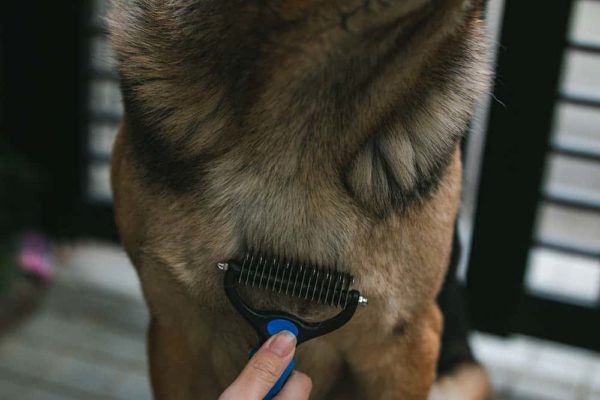How to Pick a German Shepherd Puppy: Practical Advice
So you’re considering getting a German Shepherd puppy, but have a million questions and are feeling a bit overwhelmed? Don’t fret! This guide will take you through some important steps and things to keep in mind when choosing a German Shepherd puppy.
Knowing what to look for and things to keep in mind will help you make a well-informed decision when selecting a puppy. This article offers practical advice on choosing a German Shepherd puppy that is right for you and your household.
Let’s dive in!

Choosing a German Shepherd Puppy: Begin By Researching The Breed
Make sure that you understand the German Shepherd breed in its entirety. There are certain physical characteristics, health issues, temperaments, exercise, and training needs that potential owners must consider prior to getting a German Shepherd.
Talk With Your Veterinarian & Local Dog Club
You can also talk with your veterinarian and local dog club to obtain more information. These people obviously love dogs and have years of experience dealing with different breeds. You’ll usually find that these people are excellent resources who can offer great advice.
Male or Female?
Males and females are similar in many respects but there are several differences that owners should be aware of. Males are generally larger and heavier. They range up to 24-26 inches in height at the highest point of the shoulders and weigh anywhere from 65 to 100 lbs.
Females are typically smaller and weigh less. They are usually 22-24 inches in height at the top of the shoulders and range from 50-80 lbs.
Females will also go into heat twice a year – if you choose a female but don’t want to breed her, it is recommended that she be spayed anytime after eight weeks of age but preferably before their first heat.
What Color?
Color is another thing that can be considered. German Shepherds come in many colors; the classic black and tan, black and red, black, white, and sable.
Long or Short Hair?
Many people don’t realize that German Shepherds’ coats come in several different lengths. The short haired German Shepherd is typically seen as the classic GSD that you’d see in the movies. If you decide on a long-haired GSD, make sure that you’re up for some extra grooming and brushing!

Define Your Expectations
If you’re thinking of getting your German Shepherd puppy from a breeder, it would be a good idea to convey your expectations and limitations well in advance. This will help the breeder find the perfect puppy for you and your family!
Let the breeder know if you are looking for a buddy, a working dog, a guard dog, a show dog, or even an agility dog.
No matter what plans you have for your German Shepherd puppy, all puppies from the same litter will share identical genes and lineage. Also, most puppies that come from breeders are bred for temperament, health, and trainability.
Observe the Puppy’s Temperament from a Distance
When searching for a German Shepherd puppy, whether you’re at a breeder or a shelter, try to observe the puppy and how they interact with other puppies and people.
A German Shepherd puppy should possess a good temperament, meaning that the puppy should be curious, affectionate, friendly, and unafraid of noises, people, and other dogs. A puppy that approaches other puppies and people in a friendly and playful manner is what you are looking for.
Examine the Puppy
Another thing to do is take a close look at the puppy’s fur, eyes, ears, and nose. The coat should be thick, clean, and shiny, not dull or thin. The eyes, ears, and nose should be free of any mucus or discharge.
Interact With the Puppy to Get a Feel for Potential Chemistry
Selecting a puppy that is even-tempered is critical. Like Rin Tin Tin, German Shepherds are famous for their curious, fearless, outgoing, and self-confident temperaments.
It’s recommended to avoid selecting a shy, introverted or fearful puppy, or a puppy that exhibits any kind of aggression towards you, your family, or other dogs.
You don’t necessarily want to select a puppy who is afraid of you, or runs away and hides. A puppy that responds to your voice, and runs up to you in an inquisitive and playful manner can be a good choice.

Should I Get my Puppy From a Breeder or a Shelter/Rescue?
This is a tough question for many dog owners. Do you contact a reputable breeder, or look for GSD puppies at your local shelter or rescue organization?
The answer depends on your needs and goals. For example, do you want to bring home a puppy that is AKC registered, and that has champion bloodlines? Or do you want to give an unwanted puppy a new chance at life in a loving home?
Pros of Breeders, Rescues, and Shelters
If you visit a breeder, you can see your puppy’s parents and get a pretty good idea of what your puppy will look like as an adult. You can also see the environment in which the puppy was born and raised.
From day one, you will have the chance to train and mold your puppy’s behavior.
Your puppy will already have basic social skills, be comfortable with noisy households, and may even know some basic commands.
A reputable breeder will be able to provide information regarding genetic testing of the parents, vaccination certificates, and the overall health history.
If you plan on breeding and showing GSDs yourself, AKC and registration papers will be essential.
Breeders will normally breed for both temperament and conformation, so chances are that if the parents have solid temperaments, your puppy will too.
Cons of Dog Breeders
Bringing home a puppy can be a lot of work. Potty-training, teaching basic commands, dealing with teething, and socializing your puppy are just a few of the things you need to be ready for.
Breeders can be expensive. How much they charge will depend on the location, breed, and lineage; most German Shepherd breeders will charge between $1000 and $5000 for a puppy.
Puppies require multiple veterinary exams, vaccinations, and neutering procedures, which means that you could pay higher veterinary costs for the first year or two.
Finding a reputable breeder will involve time and research – doing your due diligence is a must. In some cases, finding a reputable breeder may require traveling out of state or out of the country.

A Note About Backyard Breeders
Anyone can produce a litter of puppies – it isn’t a complicated process. However, this doesn’t necessarily mean that the breeder is cognizant of appropriate breeding practices and canine care.
When dogs are bred without the proper knowledge of genetics and lineage, puppies being born with unhealthy genetic conditions become more common.
An example of this is a life-threatening condition called megaesophagus (the enlargement of the esophagus), which has a strong genetic component in German Shepherds. Adult dogs with this condition should not be bred.
Pros of Dog Shelter/Rescue
Certain shelters and rescue centers will spay or neuter, microchip, and vaccinate all puppies before putting them up for adoption. This saves the future owner a lot of upfront costs.
Shelters are much less expensive – they’ll typically charge a minimal adoption fee while covering their medical evaluation and necessary medications beforehand.
Most importantly, by adopting you’re saving not just one life but two. The puppy you adopt will now have a loving home, and a spot has been freed up for another dog at the shelter.
Cons of Dog Shelter/Rescue
Getting a purebred German Shepherd puppy from a shelter or rescue is very rare, but it does happen. You may not know if the puppy you are adopting is a purebred or a mixed German Shepherd.
However, DNA kits are available for owners who want to know the genetic make-up of their puppy.
If you plan on showing your German Shepherd, chances are if you get your puppy from a shelter or rescue, the puppy may not have registration papers.
If You Purchase from a Breeder
The first thing that you should do is to pick out a reputable breeder. You may already have a breeder in mind whom you trust and who has a good reputation, or you may have to do some research and go through online reviews.
It’s important to note that in some cases you may have to travel to get the puppy you want, but it can be worth it in the long run if you find an appropriate breeder.
Here are some important things to look for in a breeder once you find one:
Contact the breeder
The first thing to do is contact the breeder. Since a reputable German Shepherd breeder will require certain information from you, they will ask questions such as:
Why do you want a German Shepherd puppy, and what will you be using the puppy for (i.e. show, protection, assistance dog, hiking buddy)?
Do you live in an apartment or a house? Do you have a fenced-in yard? GSDs need plenty of exercise, and ample room to run as they grow and mature.
Will your puppy be left alone for extended periods? GSDs do not do well alone, so the breeder will want to make sure that you have plenty of time to devote to your puppy.
Are you financially ready to take on a German Shepherd puppy? This is an important question because German Shepherds can be expensive to care for depending on training and health needs.
Do you have children in your household? Owners should understand the importance of puppy socialization and training to keep your family and children safe.
Do you have other pets in your household? The breeder will want to ensure that you know how to properly introduce a new puppy to other animals, such as older dogs or cats.

Things You Can Ask the Dog Breeder
Can I meet the parents? The breeder should allow you to meet the parents, and on-site if possible. Do you have any references? Good references are always a plus.
Can you guarantee the health of the puppy? All reputable breeders will offer a health guarantee in the written contract. This health guarantee often involves OFA certification of hips, eyes, elbows, and knees of the parents.
Can you provide me with a pedigree of all of the puppies? A reputable breeder will have a detailed pedigree for every puppy they sell.
How often do you breed your females? As a rule, female GSDs should not be bred more than once a year, because this allows for adequate recovery time after pregnancy and lactation.
Can you provide a medical history of the puppy? Regular veterinary exams, vaccines, and deworming are essential for puppies before they go to their new homes.
How To Pick a German Shepherd Will Come Down To Choosing The Right Dog For Your Family
Knowing what to look for in a German Shepherd puppy depends on so many factors; your expectations, goals as an owner, as well as what would fit best with your household are just a few of the things to keep in mind.
GSDs are wonderful, intelligent, and loyal dogs – they can be a great addition to any family, and there’s nothing better than cuddling up next to an adorable German Shepherd puppy
Related Reading: Best Age to Buy a German Shepherd Puppy: When You Should Take the Plunge?






























